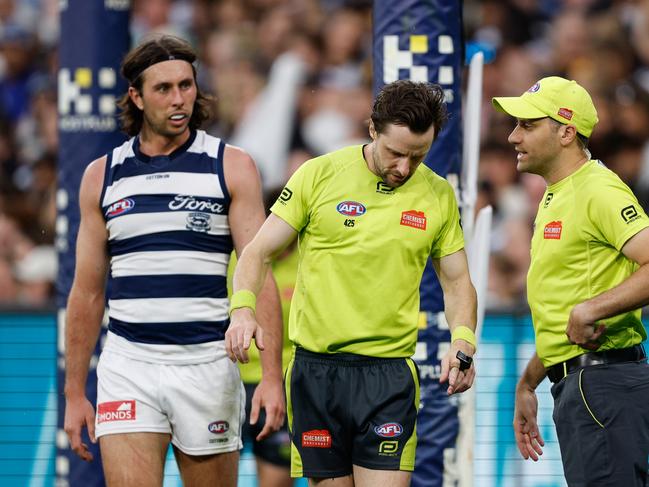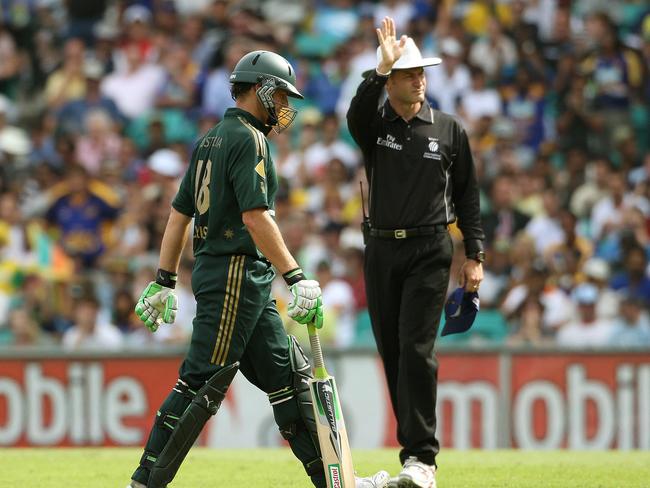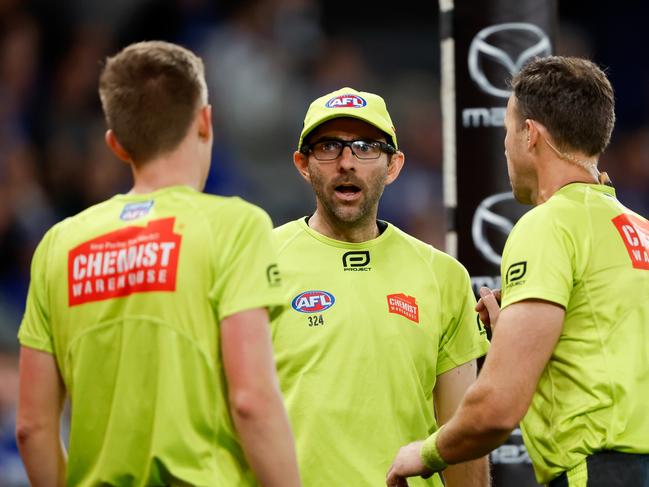Cricketing umpire Simon Taufel says over-reliance of goal reviews must be scrutinised
Legendary cricket umpire Simon Taufel says AFL umpires’ overuse of technology should be scrutinised as the league threatens to turn the “art” of umpiring into an imperfect science.

AFL
Don't miss out on the headlines from AFL. Followed categories will be added to My News.
Cricket umpiring legend Simon Taufel says match officials must be assessed “reasonably critically” on overusing technology as the AFL approaches 100 score reviews inside five rounds.
The surge in score reviews – plenty of which have been for clear-cut decisions – has become a bugbear of fans, players and commentators for slowing the game down and halting momentum.
Melbourne and Western Bulldogs supporters booed in unison when four decisions were sent to the ARC in the first quarter of their match at the MCG.
Taufel, who umpired 74 Test matches between 2000-12, told this masthead that the assessment of goal umpires would drive their behaviour.
“So it will depend upon how the umpires are assessed in their use of technology that will ultimately drive how much they use,” Taufel said.
“Match officials need to be assessed reasonably critically around overuse of technology or underuse of technology. So, in other words, are they using technology appropriately?
“Because nothing drives the fans crazier from an umpiring perspective when we use it and there’s no good reason for it.
“It’s almost like drawing a box and saying not my problem. I’ll flick past it and give it to someone else.

“And to me that’s not what good officiating is all about.
“They should be able to call it the way that they see it, but there are instances where discretion of using technology is the better outcome.
“For example in a tight game, or in a semi-final or a final where you just want to make sure.
“But if they’re not assessed critically where they using technology as a crutch, in otherwise technology is replacing rather than supporting them, that’s a bad place to be in.
“Because I think we want match officials to make decisions.”
The AFL has encouraged goal umpires to go upstairs more this year after an error that wasn’t reviewed cost Adelaide a place in last year’s finals series.
Taufel said that “battle scar” would’ve sent a “very powerful message to the rest of the group” and that mistakes usually fell into one of two buckets.
“Number one, you’re not connected with the moment, or number two you second guess yourself and you don’t trust your gut,” Taufel said.
“When you do make a mistake by not using technology you become pretty gun shy, so that can be a real hit to the confidence and you’re going to use technology more than less.”
Taufel said former NRL referee Bill Harrigan was an “incredibly confident” official had the strength to back himself over relying on evidence.

“Match officials from a psychological perspective will look at (technology) two different ways,” the 2004-2008 ICC Umpire of the Year winner said.
“Either I want to test myself and I want to get the decision right or I don’t care how I get the decision right as long as the game gets the decision we can all then move on.
“This is why officiating is not a science, it’s an art. And when you start to put technology into sport you’re changing sport from an art into science, and it doesn’t always work that way.
“It’s not designed that way because technology is not always perfect either.
“Technology is not 100 per cent perfect. But when you do go upstairs and you do use technology, the expectation from every stakeholder is that you’re always going to get it right.
“And that’s not possible either. That’s why to me technology should always be there to support the on-field official – not replace them.”
Recently retired Test umpire Bruce Oxenford said the introduction of DRS in cricket ended some umpires’ careers.

“They suddenly found themselves in a different situation, and many of them found that difficult to cope with,” Oxenford told this masthead from India, where he is umpiring the IPL.
“Some just couldn’t stand having to reverse their decisions and it played very heavily on their minds.
“Some retired and I suspect that Mark Benson was one of those. He didn’t seem to cope well with having to change his decisions.
“Certainly, I had a different mindset coming in to buy into DRS usage. For me it was it was a vast help because the same error had completely different consequences.”
Oxenford — who umpired 68 Tests from 2008-2021 — had some simple advice for nervous goal umpires.
“If you’re certain and it’s blatantly obvious, just go with it. Do it on field – don’t send it up, back yourself,” he said.
“But if there’s any hint of doubt at all use the technology. The advice I give the guys is they’ve paid a lot of money to have someone sitting in that box.
“This is a work in progress for the AFL. It’s a fairly new thing so it’s going to take a while for all the officials to work out exactly how they are going to and when they’re going to use the technology.”




